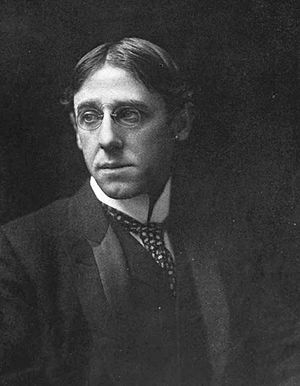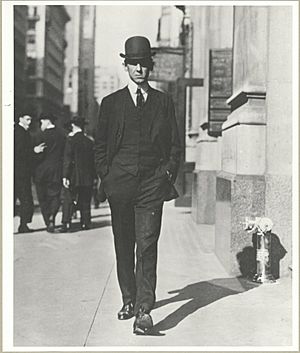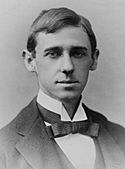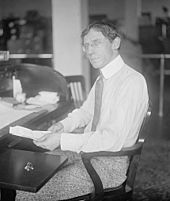Norman Hapgood facts for kids
Quick facts for kids
Norman Hapgood
|
|
|---|---|
 |
|
| United States Minister to Denmark | |
| In office June 17, 1919 – December 9, 1919 |
|
| President | Woodrow Wilson |
| Preceded by | Maurice Francis Egan |
| Succeeded by | Joseph Grew |
| Personal details | |
| Born | March 28, 1868 Chicago, Illinois, U.S. |
| Died | April 29, 1937 (aged 69) New York City |
| Resting place | Green-Wood Cemetery, Brooklyn, New York, U.S. |
| Nationality | American |
| Spouses | Emilie Bigelow Hapgood Elizabeth Kempley Reynolds |
| Alma mater | Harvard University |
| Occupation |
|
| Writing career | |
| Notable works | The Inside Story of Henry Ford's Jew-Mania |
Norman Hapgood (March 28, 1868 – April 29, 1937) was an American writer, journalist, and editor. He also served as a diplomat, representing the United States in Denmark. He was known for his strong opinions and for helping to bring important issues to public attention through his writing.
Contents
About Norman Hapgood
Norman Hapgood was born on March 28, 1868, in Chicago, Illinois. His parents were Charles Hutchins Hapgood and Fanny Louise (Powers) Hapgood. He had a younger brother, Hutchins Hapgood, who also became a journalist and author.
Early Life and Education
Norman Hapgood went to Harvard University, graduating in 1890. He then studied law at Harvard Law School, finishing in 1893. However, instead of becoming a lawyer, he chose to follow his passion for writing.
Career in Journalism and Editing
Hapgood started his career as a drama critic. He wrote reviews for the New York City Commercial Advertiser and Bookman from 1897 to 1902. In 1903, he became the editor of Collier's Weekly, a popular magazine. He stayed there for about ten years.
In June 1913, he moved to become the editor of Harper's Weekly. His way of editing was very noticeable because it was strong and covered many different topics.
Working for Peace and Diplomacy
During and after World War I, Hapgood was the president of the League of Free Nations Association. This group supported the idea of a League of Nations. The League of Nations was an international organization designed to help countries solve problems peacefully. Hapgood supported President Woodrow Wilson's efforts to create this organization at the Paris Peace Conference in 1919.
In 1919, President Wilson appointed Hapgood as the Minister to Denmark. This meant he was the top U.S. diplomat in Denmark. He served in this role for about six months. He also helped show how Henry Ford had unfair views about Jewish people in an article he wrote.
Personal Life
Norman Hapgood was married twice. His first wife was Emilie Bigelow Hapgood, whom he married in 1896. She became a well-known theater producer in New York. They divorced in 1915.
Two years later, he married Elizabeth Kempley Reynolds. Elizabeth Hapgood was fluent in Russian and was the first person to translate the writings of the famous theater director Konstantin Stanislavski into English. It was Norman Hapgood who first suggested, in 1914, that the Moscow Art Theatre should be invited to America.
Norman Hapgood passed away on April 29, 1937, in New York City. He was buried in Green-Wood Cemetery in Brooklyn, New York.
Published Works
Norman Hapgood wrote many books and essays during his career. Here are some of his notable works:
- (1897). Literary Statesmen and Others Essays on Men Seen from a Distance
- (1899). Abraham Lincoln: The Man of the People
- (1899). Daniel Webster
- (1901). George Washington
- (1901). The Stage in America, 1897–1900
- (1911). Industry and Progress
- (1919). The Jewish Commonwealth
- (1920). The Advancing Hour
- (1927). Professional Patriots (with Sidney Howard and John Hearley)
- (1927). Up From the City Streets: A Biographical Study of Alfred E. Smith (with Henry Moskowitz)
- (1929). Why Janet Should Read Shakspere
- (1930). The Changing Years
 | Chris Smalls |
 | Fred Hampton |
 | Ralph Abernathy |




